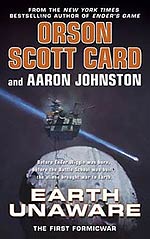
![]() spectru
spectru
4/18/2014
![]()
Review written July 14, 2012
This is a can't-put-it-down book - good science fiction.
Starting with Ender's Game, I had read four other Orson Scott Card books when I acquired this one. Earth Unaware is the prologue to Ender's Game. Though published many years later, Card wrote Earth Unaware in pretty much the same style as Ender's Game. What I'm saying here is that if you liked Ender's Game, you'll like Earth Unaware. Unlike Ender's Game, however, Earth Unaware does not really stand alone. It most definitely is the first in a series. It is foreplay - while enjoyable, it isn't fully satisfying. It never reaches its climax. It is subtitled "The First Formic War" but this story is the preamble to that war. We are introduced to Mazer Rackham, a recruit in an elite special-ops military unit. Mazer Rackham is a character in Ender's Game, and a pivotal figure in history prior to the story told in Ender's Game. However, Rackham never sees action in Earth Unaware and has no apparent connection to the main plot. Presumably, having been introduced in Earth Unaware, Rackham will be important in the next book. I'm not a fan of series - movies, TV shows, or books. Of course, I've read a few, including Card's Ender Wiggins series (which I had not yet finished when I read this one) but usually I don't move past the first book in a series. I expect that I will probably read the rest of the Earth Unaware series, as yet unpublished as of this writing, because Orson Scott Card is that good a writer. And this one does leave one hanging, wanting to know what will happen next.
You can skip the next couple of paragraphs if you want. It's just nit picking, minutiae.
There were some discrepancies, technical inconsistencies, not uncommon in science fiction and not uncommon in fiction in general. Nothing awful, but as one who enjoys the science part of science fiction, they annoyed me, but only slightly. There seemed to be a lot of concern about having to stop space ships traveling at high speed, in order to minimize danger during space walks or docking and so occasionally they had to stop mid-flight, or fretted about not stopping. They were especially concerned about men being hit by small particles, but I think there would always be that possibility regardless of the speed being traveled. I think the velocity of two ships docking would be immaterial as long as they were able to match speeds. One character, after having been knocked off the exterior of a ship traveling at high speed, with other ships nearby traveling at the same speed, suddenly found himself alone in the void with no space ships in sight. It seems to me, that since he was traveling more or less at the same speed of the ships, within a few feet per second, he should have been able to keep a kilometer-wide space ship in sight for a long time.
Quick ships are one-way high speed cargo ships used to carry mined minerals from the Kuiper Belt back to Luna. Our protagonists modified the piloting software (LUG, for lunar guidance) which they had never used before, to make a quick ship suitable for local maeuvering. They should not have been unfamiliar with the piloting software because these quick ships should have also been used for sending supplies and equipment from Luna out to them in the Kuiper Belt. Also, these cargo ships were not suitable for human transportation because humans couldn't withstand the g-forces of the extreme acceleration and deceleration. So when they needed to send a man to Luna as fast as possible, they modified the quick ship software to reduce the acccel and decel forces. This extended the normal travel time of five or six months by an extra month or two. If it were so simple, there would already have been passenger quick ships.
I'll stop my picky-picky rant here. Sorry for the length of this review. If I'd had more time perhaps I could have made it shorter.
The bottom line is that this is an enormously entertaining science fiction book. I finished the 14-hour audiobook version in a day and a half.